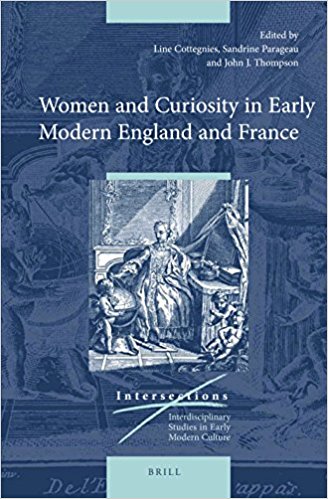Version française / Publications
- Publication (fiche article uniquement),
Women and Curiosity in Early Modern England and France
sous la direction de Line Cottegnies, Sandrine Parageau et John Thompson
Publié le 5 mars 2017 – Mis à jour le 5 mars 2017
In Women and Curiosity in Early Modern England and France, the rehabilitation of female curiosity between the sixteenth and the eighteenth centuries is thoroughly investigated for the first time, in a comparative perspective that confronts two epistemological and religious traditions.

In the context of the early modern blooming “culture of curiosity”, women’s desire for knowledge made them both curious subjects and curious objects, a double relation to curiosity that is meticulously inquired into by the authors in this volume. The social, literary, theological and philosophical dimensions of women’s persistent association with curiosity offer a rich contribution to cultural history.
Contributors are Yan Brailowsky, Laetitia Coussement-Boillot, Armel Dubois-Nayt, Adeline Gargam, Sarah Hutton, Neil Kenny, Marie-Gabrielle Lallemand, Laura Levine, Christophe Martin, Marie-Frédérique Pellegrin, Beth Fowkes Tobin, and Susan Wiseman.
Relié: 304 pages
Editeur : Brill (14 avril 2016)
Langue : Anglais
ISBN-13: 978-9004311831
www.brill.com/products/book/women-and-curiosity-early-modern-england-and-france
Biographies des directeurs de l'ouvrage
Contributors are Yan Brailowsky, Laetitia Coussement-Boillot, Armel Dubois-Nayt, Adeline Gargam, Sarah Hutton, Neil Kenny, Marie-Gabrielle Lallemand, Laura Levine, Christophe Martin, Marie-Frédérique Pellegrin, Beth Fowkes Tobin, and Susan Wiseman.
Relié: 304 pages
Editeur : Brill (14 avril 2016)
Langue : Anglais
ISBN-13: 978-9004311831
www.brill.com/products/book/women-and-curiosity-early-modern-england-and-france
Biographies des directeurs de l'ouvrage
- Line Cottegnies, Ph.D. (1994), Université Sorbonne Nouvelle Paris 3, is Professor of English Renaissance Literature at that university. She has published widely on Caroline poetry, early-modern women authors and translation. She also has an interest in editing early modern texts.
- Sandrine Parageau, Ph.D. (2008), Université Sorbonne Nouvelle Paris 3, is lecturer in English history at Université Paris Nanterre. She has published Les Ruses de l'ignorance (Paris: 2010), as well as articles and book chapters on women philosophers.
- John J. Thompson, D.Phil (1983), Queens University, Belfast, is Professor of English Textual Cultures in the Institute for Collaborative Research in the Humanities. He is author of two monographs and many essays on English lay reading experience, c. 1300-1600.
Table of Contents
Notes on Contributors
List of illustrations and tables
Line Cottegnies and Sandrine Parageau, “Introduction”
1. Yan Brailowsky (Université Université Paris Nanterre), “Curiosity and Gynocracy in the Sixteenth Century”
2. Armel Dubois-Nayt (Université Versailles Saint-Quentin), “Curious Men and Women in the Tudor Controversy about Women”
3. Laura Levine (Tisch School of The Arts, New York University), “This Is and Is Not Knowledge: Cressida and the Titillation of Male Curiosity in Shakespeare’s Troilus and Cressida”
4. Laetitia Coussement-Boillot (Université Paris 7 Diderot), “‘Too Curious a Secrecy’: Curiosity in Lady Mary Wroth’s Urania (1621)”
5. Line Cottegnies (Université Sorbonne Nouvelle – Paris 3), “Margaret Cavendish or the Curious Reader”
6. Marie-Gabrielle Lallemand (Université de Caen Basse Normandie), “On the Proper Use of Curiosity: Madeleine de Scudéry’s Célinte”
7. Susan Wiseman (Birkbeck College, University of London), “Curious tails: Mermaids under the Microscope”
8. Sarah Hutton (University of York), “The Interrogative Anne Conway: Curiosity in a Philosophical Context”
9. Marie-Frédérique Pellegrin (Université Jean Moulin Lyon 3), “Female Curiosity and Male Curiosity about Women: The Views of the Cartesian Philosophers”
10. Christophe Martin (Université Paris Sorbonne), “Women’s Curiosity and its Double at the Dawn of the Enlightenment”.
11. Adeline Gargam (Institut d’histoire de la pensée classique, Lyon), “Between Scientific Investigation and Vanity Fair: A Few Reflections on the Culture of Curiosity in Enlightenment France”
12. Beth Fowkes Tobin (University of Georgia), “Virtuoso or Naturalist? Margaret, Duchess of Portland (1715-1785)”
13. Neil Kenny (All Souls College, Oxford University), “Curiosity, Women, and the Social Orders”
Index
Mis à jour le 05 mars 2017












